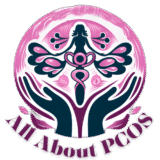How PCOS Causes Painful Regular Periods (Painful Regular Periods PCOS Explained)
Many women wonder if painful regular periods could be linked to PCOS. Polycystic Ovary Syndrome (PCOS) is a hormonal disorder that affects millions worldwide. While it’s often tied to irregular cycles, some women experience painful regular periods with PCOS — and don’t even realize it.
It’s often linked to irregular periods, acne, weight gain, excess hair growth, and ovarian cysts — but here’s something many people don’t realize:
You can have PCOS even if your periods come regularly.
PCOS looks different for every woman. Some experience skipped cycles, while others have monthly periods but still struggle with pain, inflammation, or hormonal imbalance.
How PCOS Is Diagnosed
Doctors usually follow the Rotterdam Criteria, which require two of the following three signs:
Irregular or absent periods (ovulatory dysfunction)
High androgen levels (seen in acne, facial hair, or blood tests)
Polycystic ovaries seen on ultrasound
👉 Key takeaway: Regular periods don’t automatically rule out PCOS.
My Personal Story
I still remember my first period at age 12 — and the pain that came with it.
Every month, I would be doubled over in cramps so intense I could hardly stand. Some days, I stayed in bed; other times, if I was at school, I’d end up lying down in the nurse’s office after being given painkillers. My flow was heavy, my energy was gone, and I couldn’t understand why this was happening.
At that age, I had no idea PCOS even existed — and no one connected my symptoms to a deeper hormonal imbalance. I thought painful periods were just part of being a woman. Years later, I learned that wasn’t the case.
Even women with painful regular periods and PCOS may not realize that their cycles are technically anovulatory.
Why Do I Have Regular Periods but Still Experience Pain?
Many women ask, “Can you have PCOS with regular periods?”
The answer is yes. Regular cycles don’t always mean balanced hormones. In fact, PCOS period pain is common because inflammation and hormonal imbalance can still affect your body, even when your period arrives on time.
Painful periods (known as dysmenorrhea) don’t always mean your cycle is “normal” or “healthy.” In fact, period pain can be a sign that something else is going on, even when your cycle appears regular.
Common reasons for painful but regular periods:
Hormonal imbalances (too much estrogen, not enough progesterone)
Inflammation in the body
Uterine lining irregularities
Ovarian cyst pressure or rupture
Having a monthly period doesn’t guarantee your body is ovulating properly — and that’s where PCOS can still play a hidden role.
How PCOS Can Cause Painful Periods — Even with Regular Cycles
Yes, PCOS can absolutely cause pain even if your periods are regular. Here’s why:
Ovarian cysts may swell or rupture, causing pelvic discomfort.
Inflammation, which is common with PCOS, can make cramps more intense.
Hormonal imbalance (like low progesterone or high estrogen) can thicken the uterine lining, leading to heavier, more painful periods.
Enlarged ovaries can trigger sharp, mid-cycle pain around ovulation.
In short — your calendar might look regular, but your hormones may still be working overtime behind the scenes.
Other Conditions to Rule Out
If your period pain is severe, it’s important to explore other possible causes, since PCOS symptoms often overlap with other conditions:
Endometriosis: when uterine tissue grows outside the uterus
Uterine fibroids: noncancerous growths that can cause pain and heavy bleeding
Pelvic Inflammatory Disease (PID): often caused by infections
Adenomyosis: tissue growing into the uterine muscle wall
Getting the right diagnosis can help you find the best relief.
When to See a Doctor
If your period pain affects your daily life — even if your cycle seems “normal” — don’t ignore it.
You should see your doctor if you notice:
Sudden increase in pain intensity
Heavy bleeding (soaking pads or tampons hourly)
Pain outside your period (during ovulation or sex)
Fertility challenges
Ask about:
Hormone testing: testosterone, LH, FSH, estrogen, and insulin
Pelvic ultrasound: to check for cysts or thickened tissue
Cycle tracking: to identify ovulation patterns
Managing PCOS-Linked Period Pain
Relief usually comes from a mix of lifestyle, medical, and natural approaches. Here are options that can help:
🌿 Lifestyle Adjustments
Anti-inflammatory diet: whole foods, healthy fats, omega-3s
Stress reduction: deep breathing, meditation, quality sleep
Weight balance: helps improve insulin resistance and hormone balance
💊 Medical Treatments
Hormonal birth control: regulates hormones and reduces period pain
Metformin: for insulin resistance-related PCOS
NSAIDs (like ibuprofen): relieve inflammation and cramps
🌸 Natural Remedies
Heat therapy: heating pads or warm baths relax pelvic muscles
Supplements: magnesium and omega-3s may help reduce cramps
Acupuncture: supports hormonal and pain regulation
Myth-Busting: Regular Periods Don’t Mean No PCOS
One of the biggest myths is that regular cycles equal hormonal balance — but that’s not always true.
Many women with PCOS still ovulate or have consistent cycles, yet their hormones remain unbalanced. Others may have cycles that look “normal” because of birth control or other factors.
👉 Always look at the full picture — not just the timing of your period.
🗣️ Voice Search Optimized FAQs
Q1: Can you have PCOS even if you have regular periods?
Yes. PCOS can still be diagnosed if you have high androgen levels or polycystic ovaries, even with consistent cycles.
Q2: What are the signs of PCOS besides irregular periods?
Acne, hair thinning, weight gain, ovarian cysts, and fertility struggles.
Q3: Why do I get painful periods every month?
Pain can come from hormonal imbalance, inflammation, or conditions like endometriosis or PCOS.
Q4: How can I tell if my period pain is caused by PCOS?
Hormone tests and pelvic ultrasounds help confirm if PCOS is the cause.
Q5: Can you still ovulate with PCOS?
Yes. Some women with PCOS ovulate regularly or occasionally — it varies by person.
Final Thoughts
Regular periods don’t always mean balanced hormones.
If your cycles come like clockwork but bring intense pain, listen to your body — it’s trying to tell you something.
I wish I had known that sooner. For years, I accepted pain as “normal,” but understanding PCOS changed everything.
You deserve answers, comfort, and a body that feels in sync with you.
If you’ve been living with painful regular periods caused by PCOS, it’s time to explore the root cause — not just the symptoms.
Don’t ignore your pain — it’s not just a symptom; it’s a signal.
The more you understand your body, the more power you have to heal it.

